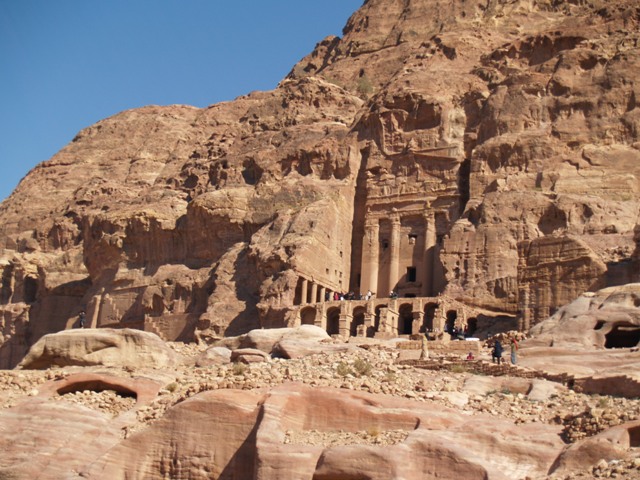This stone stands on the land of Daoud Nassar, a Palestinian Christian living in the West Bank, southwest of Bethlehem–land that has been in his family since 1916, and has been cultivated by them throughout that time. For years, Daoud Nassar and his family have hosted Tent of Nations, a work camp dedicated to fostering peace and understanding among the world’s communities. But since 1991, the Nassar family has been in a battle in Israeli state courts, resisting attempts by Israel’s government to seize their land. The stone declares the purpose of Tent of Nations, and the commitment of the Nassar family to nonviolent resistance, in Hebrew, Arabic, English, and German: “We refuse to be enemies.”
Standing in stark contrast to this is the cynical game of adversarial politics, where those who disagree with me or differ from me are made into my enemies. These posters from Israeli Prime Minister Benjamin Netanyahu‘s successful re-election campaign read, “This is us or them. Only Likkud [Netanyahu’s party]. Only Netanyahu.” During the campaign, Netanyahu warned against Arab Israelis turning out to vote “in droves”–a remark for which he has apologized since the election.

Similarly, in this country, we seem prepared to believe nearly anything of those with whom we disagree. In February of last year, Fox News personality Brit Hume tweeted to his followers, “There are now people seriously arguing for abortion AFTER BIRTH.” He referenced an article, then already two years old in the online journal Slate, by William Saletan. In that article, Saletan took to task an argument for infanticide in some cases, which had been published in a medical journal. Despite the fact that this was not a policy proposal, that it has been supported by no one, and that the article cited refuted the hypothetical arguments advanced, Hume’s tweet was picked up elsewhere, and grew. In November of last year, an article in the online magazine Political Ears was headlined, “DEMOCRATS WANT TO LEGALIZE ‘POST BIRTH ABORTION’ UP TO AGE 4.”
Saletan sadly comments on this entire charade (the emphasis in the following quote is mine):
Why do we do this? Why do we hype stories like this one, assuming the worst, failing to check the details or even read the article? Because we love to be outraged, and our outrage is useful. . . . If you think this disease is confined to the right, you’re kidding yourself. Every day, I see it on the left. I see it at Slate. I see it among people who think they’re enlightened and critically astute.
Outrage against the enemy is the theme of Obadiah: the shortest book in the Old Testament, tucked among other short books in the Book of the Twelve. The twenty-one verses that make up this book are entirely given over to the condemnation of an enemy of Israel, namely Edom:
Look now, I will make you of little importance among the nations;
you will be totally despised.
Your proud heart has tricked you—
you who live in the cracks of the rock,
whose dwelling is high above.
You who say in your heart,
“Who will bring me down to the ground?”
Though you soar like the eagle,
though your nest is set among the stars,
I will bring you down from there,
says the LORD (Obad 2-4)
Why does Obadiah show such hostility toward Edom? After all, Edom was only a minor kingdom, located south of Judah. Indeed, some texts regard Edom positively: Deuteronomy 23:7-8 permits Edomites who have lived among the people of Israel for three generations to be included in the worshipping congregation, and even Obadiah recognizes Edom as a place of ancient wisdom (Obad 8).
According to ancient tradition, the people of Edom were the descendants of Isaac’s eldest son Esau (see Gen 36:1–43), who is also called Edom (see Gen 25:25, 30; note that in Hebrew, ‘edom means “red”–referring perhaps to the red sandstone cliffs of this region). The Israelites were descended from Esau’s twin brother Jacob, who is also called Israel (Gen 32:22–32). In Genesis, the hostility between Edom and Israel begins in the womb (Gen 25:22-23; see Obad 10; Mal 1:2-3; Rom 9:10-15) and continues through the brothers’ early lives.
When Jacob by trickery steals the deathbed blessing their father had intended for Esau, Isaac pronounces over his eldest son the only “blessing” he has left to give:
You will live by your sword;
you will serve your brother.
But when you grow restless,
you will tear away his harness
from your neck (Gen 27:40).
Although Genesis 33:1-17 describes the reconciliation of the two brothers, other biblical texts describe continued hostility between the rival kingdoms, culminating in Edom’s participation in the sacking of Jerusalem after Babylon’s conquest (for example, Ps 137:7; Lam 4:21–22). Obadiah cries out against Edom’s betrayal:
You stood nearby,
strangers carried off his wealth,
and foreigners entered his gates
and cast lots for Jerusalem;
you too were like one of them.
But you should have taken no pleasure over your brother
on the day of his misery;
you shouldn’t have rejoiced over the people of Judah
on the day of their devastation;
you shouldn’t have bragged
on their day of hardship.
You shouldn’t have entered the gate of my people
on the day of their defeat;
you shouldn’t have even looked on his suffering
on the day of his disaster;
you shouldn’t have stolen his possessions
on the day of his distress.
You shouldn’t have waited on the roads
to destroy his escapees;
you shouldn’t have handed over his survivors
on the day of defeat (Obad 10-14).
In the end, however, Obadiah is not about vengeance over Edom. Edom becomes, in the final form of this little book, a symbol for every enemy, every oppressor:
The day of the Lord is near
against all the nations.
As you have done, so it will be done to you;
your actions will make you suffer! (Obad 15).
The end of the book is not vengeance, but justice–and possibly, reconciliation. In the day to come, this prophet declares, all the nations will become one:
The deliverers will go up to Mount Zion
to rule Mount Esau,
and the kingdom will be the LORD’s (Obad 21).
Under the rulership of the LORD, all our divisions cease; all our hostilities are stilled. While the language of adversarial politics seeks to enlist God on our side–whatever that side might be–Obadiah reminds us that the real question is whether we are on God’s side.
Abraham Lincoln expressed this well in his second inaugural address. Looking back in sadness to the beginning of the Civil War, he wryly observed:
Each looked for an easier triumph, and a result less fundamental and astounding. Both read the same Bible and pray to the same God, and each invokes His aid against the other. It may seem strange that any men should dare to ask a just God’s assistance in wringing their bread from the sweat of other men’s faces, but let us judge not, that we be not judged. The prayers of both could not be answered. That of neither has been answered fully. The Almighty has His own purposes.


Another insightful blog post. Thank you Dr. Tuell.